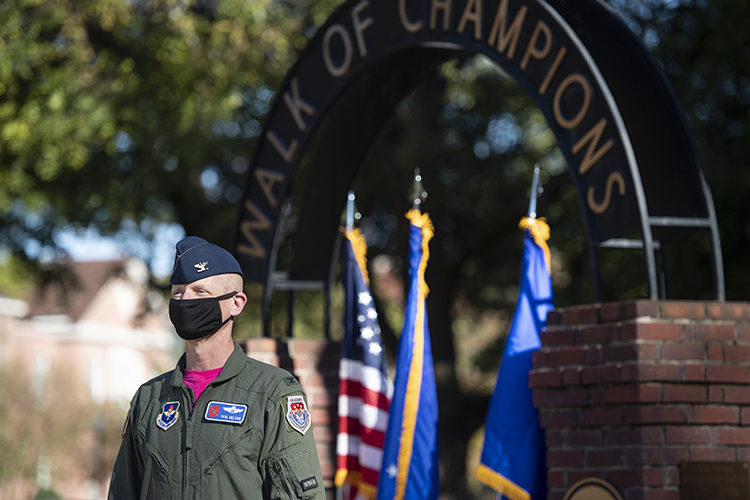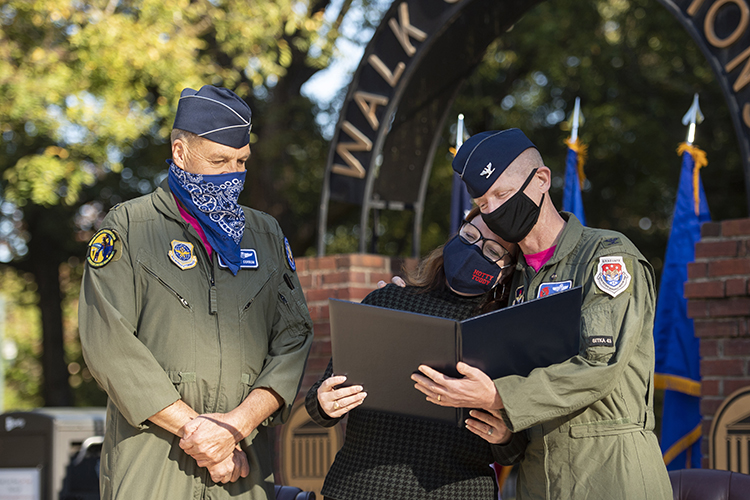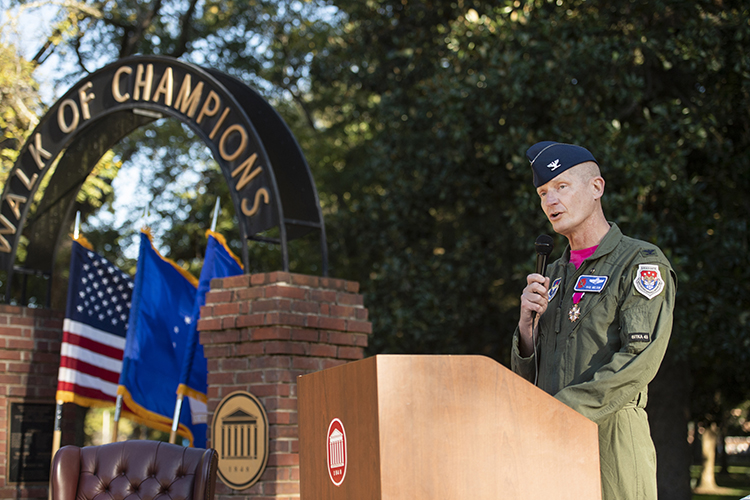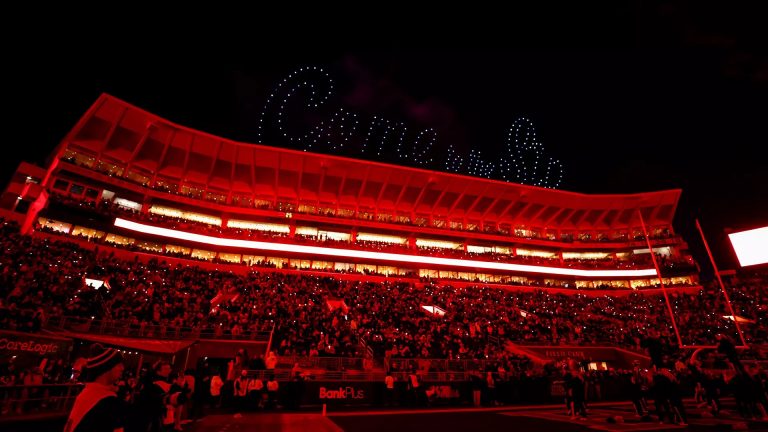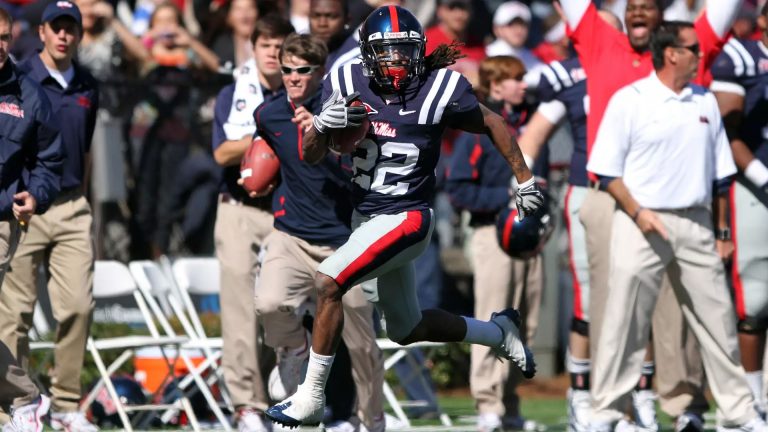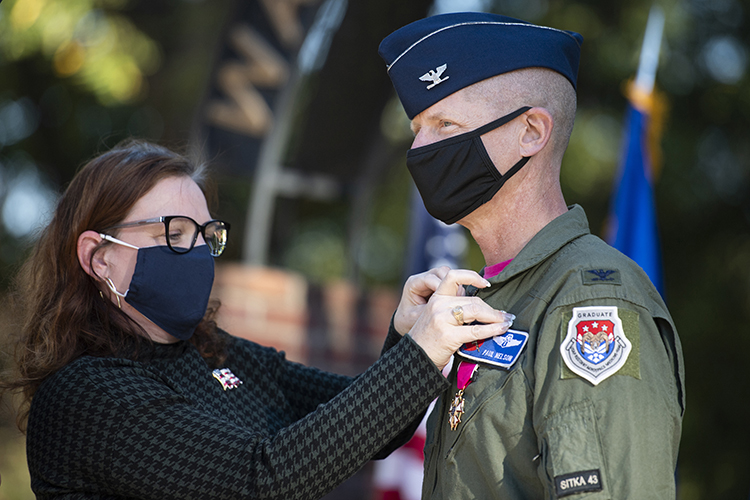
Betsy Nelson pins the Air Force retirement pin to her husband's flight suit. Col. Paul 'Voodoo' Nelson held his retirement ceremony at the Walk of Champions, the same place he was commissioned more than three decades earlier. Photo by Logan Kirkland/Ole Miss Digital Imaging Services
Col. Paul ‘Voodoo’ Nelson hopes to pass on legacy of service in return home
On a sunny October afternoon, retiring Air Force flight surgeon Col. Dr. Paul Nelson (BA 89) and wife Betsy Moore Nelson (BS 89) welcomed friends and family to the University of Mississippi to mark a three-decade arc that has taken them around the world and right back where they began.
Standing in The Grove, they were joined by many friends and colleagues around the world in a virtual ceremony as they commenced their next phase of life, this time in service as a retired military couple.
A graduate of the Air Force Reserve Officer Training Corps program’s Detachment 430 at Ole Miss, Nelson was commissioned more than 31 years earlier in the very same location in The Grove. His retirement celebration beneath the Walk of Champions arch included family, friends, members of the community and fellow service members.
“Paul is one of the few doctors who believes that when he becomes your doctor, he is all in; you got his personal cellphone and email because he takes the patient-physician relationship seriously,” retired Brig. Gen. (Dr.) Kory Cornum said. “He epitomizes the whole-person concept: good doctor, aviator and airman, but also good husband, father, son, and good friend and neighbor.”
Air Force chaplain Col. Mike Newton began the ceremony with an opening prayer, inviting all those in attendance to reflect in their personal faith tradition. Newton thanked God for leading Nelson from the “hallowed halls of his alma mater into the profession of medicine and armed service,” and asked God to bless Betsy Nelson, “as she has in many ways blessed Paul’s service”
After Nelson led the attendees, both virtual and in-person, in a rousing Hotty Toddy, the retiring officer shared some thoughts.
Retired Lt. Gen. Doug Robb, who led a virtual retirement party on the Oxford Square after the ceremony, joined Cornum and Nelson in lauding the professionalism and energy of the Ole Miss AFROTC team.
Under the leadership of detachment commander Lt. Col. Chris Maroney, the AFROTC cadets coordinated the virtual retirement program on short notice. They researched and complied with local, state, federal and Air Force guidance to safely execute a socially distanced outdoor and virtual ceremony in the midst of a pandemic.
Maroney also has deep ties to the AFROTC program that he leads, as a graduate of the Detachment 430 A unit at Delta State University that was previously aligned under the Ole Miss unit.
Inspiring the Next Generation
Joining the ceremony was another Ole Miss AFROTC alumnus, retired Col. Orville Robertson (BA 63), who served as Nelson’s first AFROTC commander in the mid-1980s. Robertson, a native of Batesville, returned to Oxford in 1984, after his retirement from the Air Force, and also served as the South Panola Junior AFROTC Commander, mentoring students from his hometown.
Robertson and Nelson compared notes about service, with Nelson relaying stories about his service as Civil Air Patrol senior mentor faculty adviser, working with organizations across Montgomery and the Alabama River Region.
He described an entire community team that developed a program to introduce underprivileged students in the Montgomery area to aviation. Experienced military aviators and leaders worked with young people in the community as mentors, even taking them on orientation flights and offering further flight lessons.
“The goal was never just to have the kids join the military, although certainly we were all very proud that some former students have gone on to enlist, or competed successfully for ROTC or service academy scholarships,” Nelson said. “Rather, the team’s objective was to provide support and mentorship for these kids, and give them the opportunity to see the world and all of its possibilities, their possibilities, from a new lens.
“Whether it was at the controls of an airplane while flying for the first time, learning how to come together as part of a team, or participating in STEM activities with mentorship from successful adults they could look up to … it was about paying it forward to those kids less fortunate than we were.”
Continuing a Legacy of Service
In the early days of retirement, Nelson finds himself reflecting about the way the Oxford community and UM faculty members, specifically within the AFROTC program, put him on the path to public service that has defined his past three decades.
Remembering Jerry Lexa and Don Faulkner, two veterans who retired into civilian service as Oxford school teachers, Nelson cannot help but feel a duty to find a new service role. Those two men were special mentors to Nelson growing up.
“All these leaders had a service ethic and they passed it on to kids like me who looked up to them,” he said. “That was the powerful thing growing up in Oxford – the service ethic of our mentors and teachers and coaches and community members.
“Further service in uniform has given me an opportunity to get to know people I never would have known and see and do things I never would have been able to see and do. Now I have the honor of coming to my hometown and share some of that.”
Nelson loves the Air Force, and all it had to offer him from the start, but it took him some time to realize his real purpose and calling within that institution.
“I joined for all the wrong reasons,” he said. “I thought I would look cool in a flight suit, and that chicks would dig me, and I would get to fly in cool jets. I went to medical school because you could be your own boss and live in a fancy house with a cool car.
“While some of that did happen, and I indeed got the girl of my dreams, those are terrible reasons to choose a career. And while I drive a used SUV daily, I live in the house I grew up in, which is pretty cool!”
More than 20 years after his commissioning, Nelson found himself in southern Afghanistan, caring for 650 wounded Marines. Most of these young men and women were having the worst day in their lives.
It was during that time in 2010, in the depths of the Marjah Offensive, that Nelson received a clipping of Lexa’s obituary.
“When I got that obituary, I felt on some level like I was standing on Jerry’s shoulders,” he said. “I was over there to be a part of his legacy. That stewardship and responsibility helped me get through it.”
As Nelson begins his next life chapter as a civilian back in his hometown, he hopes to be that experienced guide for young people here – the link between Robertson and Lexa’s generation and Oxford’s next legion of public servants, those who want to go on to be a part of something bigger than themselves, something they never dreamed they could be.
Just because he’s hanging up his flight suit doesn’t mean he’s finished serving. Nelson said he’s not sure what’s next, whether it involves applying his infectious disease experience from the H1N1 crisis to the COVID-19 pandemic, working with veterans on campus, finding a way to mentor young people, or simply practicing medicine in the community.
The one thing he knows for sure is that he wants to pass something on to the next generation of public servants.
By JB Clark

